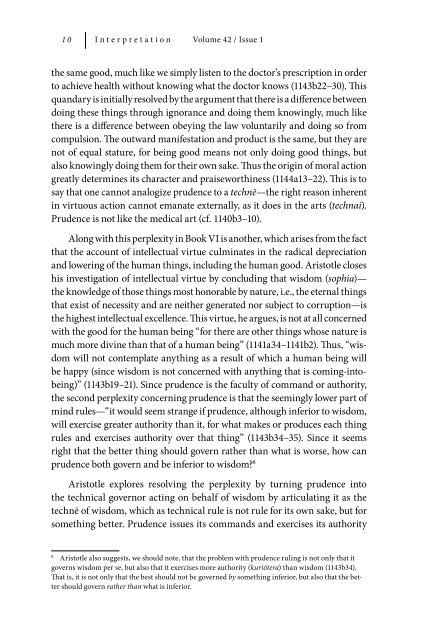Fall 2015
Vol_42_1
Vol_42_1
- No tags were found...
You also want an ePaper? Increase the reach of your titles
YUMPU automatically turns print PDFs into web optimized ePapers that Google loves.
1 0 I n t e r p r e t a t i o n Volume 42 / Issue 1<br />
the same good, much like we simply listen to the doctor’s prescription in order<br />
to achieve health without knowing what the doctor knows (1143b22–30). This<br />
quandary is initially resolved by the argument that there is a difference between<br />
doing these things through ignorance and doing them knowingly, much like<br />
there is a difference between obeying the law voluntarily and doing so from<br />
compulsion. The outward manifestation and product is the same, but they are<br />
not of equal stature, for being good means not only doing good things, but<br />
also knowingly doing them for their own sake. Thus the origin of moral action<br />
greatly determines its character and praiseworthiness (1144a13–22). This is to<br />
say that one cannot analogize prudence to a technē—the right reason inherent<br />
in virtuous action cannot emanate externally, as it does in the arts (technai).<br />
Prudence is not like the medical art (cf. 1140b3–10).<br />
Along with this perplexity in Book VI is another, which arises from the fact<br />
that the account of intellectual virtue culminates in the radical depreciation<br />
and lowering of the human things, including the human good. Aristotle closes<br />
his investigation of intellectual virtue by concluding that wisdom (sophia)—<br />
the knowledge of those things most honorable by nature, i.e., the eternal things<br />
that exist of necessity and are neither generated nor subject to corruption—is<br />
the highest intellectual excellence. This virtue, he argues, is not at all concerned<br />
with the good for the human being “for there are other things whose nature is<br />
much more divine than that of a human being” (1141a34–1141b2). Thus, “wisdom<br />
will not contemplate anything as a result of which a human being will<br />
be happy (since wisdom is not concerned with anything that is coming-intobeing)”<br />
(1143b19–21). Since prudence is the faculty of command or authority,<br />
the second perplexity concerning prudence is that the seemingly lower part of<br />
mind rules—“it would seem strange if prudence, although inferior to wisdom,<br />
will exercise greater authority than it, for what makes or produces each thing<br />
rules and exercises authority over that thing” (1143b34–35). Since it seems<br />
right that the better thing should govern rather than what is worse, how can<br />
prudence both govern and be inferior to wisdom? 8<br />
Aristotle explores resolving the perplexity by turning prudence into<br />
the technical governor acting on behalf of wisdom by articulating it as the<br />
technē of wisdom, which as technical rule is not rule for its own sake, but for<br />
something better. Prudence issues its commands and exercises its authority<br />
8<br />
Aristotle also suggests, we should note, that the problem with prudence ruling is not only that it<br />
governs wisdom per se, but also that it exercises more authority (kuriōtera) than wisdom (1143b34).<br />
That is, it is not only that the best should not be governed by something inferior, but also that the better<br />
should govern rather than what is inferior.


